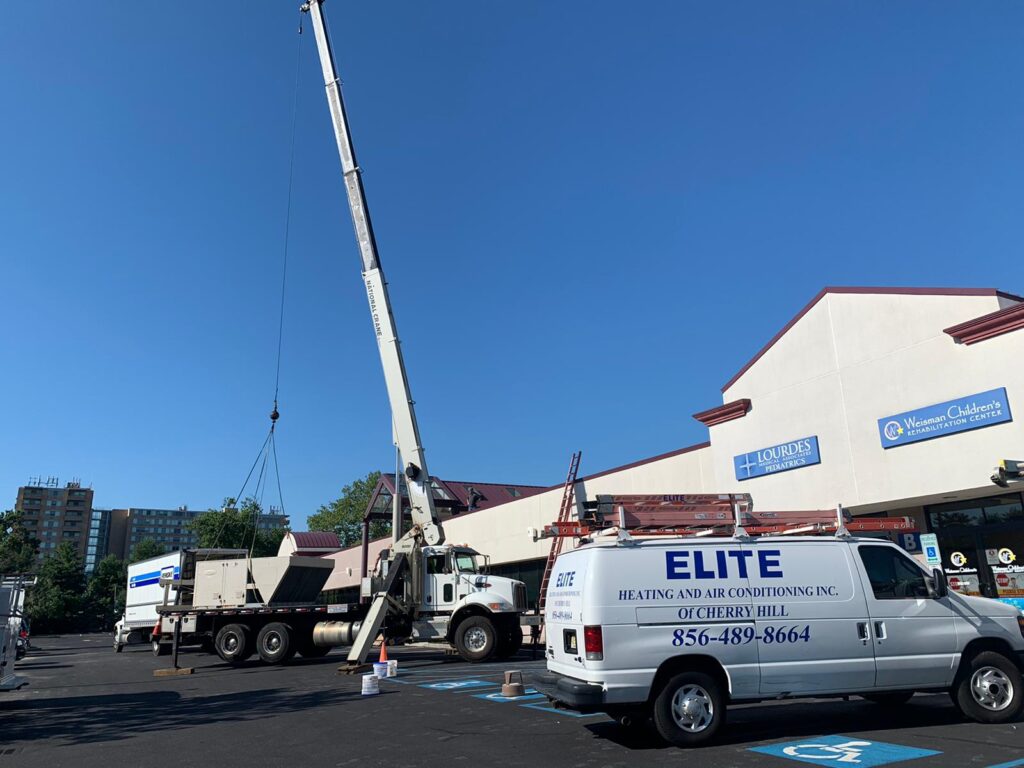When a commercial AC unit constantly turns on and off, it’s more than just a minor annoyance—it’s a problem known as “short cycling.” Short cycling reduces cooling efficiency, wears down your HVAC system, and leads to higher energy costs. If your commercial AC won’t stay on long enough to cool your space effectively, here’s what might be causing the issue and how to address it.
1. Thermostat Issues or Poor Placement
In commercial settings, thermostats control the temperature across multiple zones. If the thermostat is malfunctioning or placed in an area where it can’t get an accurate temperature reading (like near a window or an air vent), it may cause the AC to short cycle.
- What to Check: Make sure the thermostat is set to an appropriate temperature and check for error messages. Verify that it’s not exposed to direct sunlight or drafts, as these can cause the thermostat to misread temperatures.
- Professional Solution: An HVAC technician can recalibrate the thermostat or relocate it if it’s in a problematic spot. For businesses with outdated thermostats, upgrading to a programmable or smart thermostat can improve temperature accuracy and prevent short cycling.
2. Dirty or Clogged Air Filters
Air filters play a critical role in ensuring consistent airflow throughout your HVAC system. In commercial buildings, where air filters are exposed to high volumes of dust and contaminants, a clogged filter can limit airflow, causing the unit to overheat and shut off prematurely.
- What to Look For: Inspect air filters for visible dirt or dust buildup. If the filters are noticeably dirty, they’re likely causing restricted airflow, which can lead to short cycling.
- Quick Fix: Replace air filters regularly—at least every 1-3 months in commercial environments. Regular filter replacements will help prevent airflow issues and keep the system running smoothly.
3. Refrigerant Leaks
Low refrigerant levels can trigger short cycling, as the system will shut off to protect itself from damage. In a large commercial AC, refrigerant leaks can be challenging to detect but lead to significant cooling performance issues if left unchecked.
- What to Look For: Signs of a refrigerant leak include weak cooling, longer cooling cycles, or frost on refrigerant lines or coils. If you suspect a leak, avoid running the AC continuously as it can damage the compressor.
- Professional Solution: Refrigerant handling should only be done by certified HVAC technicians. They can locate and repair leaks, then recharge the system to restore proper cooling and prevent further cycling issues.
4. Oversized or Undersized AC Unit
If an AC unit is too large for the building’s needs, it may cool the space too quickly, causing the thermostat to turn the unit off before completing a full cooling cycle. Conversely, an undersized unit may struggle to keep up, leading to short cycling as it repeatedly tries to meet the set temperature.
- What to Consider: Oversized units cycle on and off quickly, while undersized units run constantly but don’t maintain temperature.
- Expert Insight: An HVAC professional can perform a load calculation to ensure your AC system is appropriately sized. If necessary, they may recommend system adjustments or replacements to achieve consistent cooling without short cycling.
5. Electrical Issues
Commercial HVAC systems rely on complex electrical components, and any fault in the wiring, relay switches, or control boards can lead to short cycling. Electrical issues may cause the system to lose power temporarily, restarting once it detects the issue.
- What to Look For: Check your circuit breaker panel for tripped breakers. If short cycling is paired with a frequent need to reset the breaker, it’s likely an electrical issue.
- Professional Solution: An HVAC technician can inspect your system’s electrical components to identify and repair any faulty wiring or relay issues. Prompt repair prevents damage to your AC unit and ensures safe, reliable operation.
Quick Reference Guide: Short Cycling Causes and Solutions
| Cause | Signs | DIY Tips | When to Call a Professional |
|---|---|---|---|
| Thermostat Issues | Unit turns on/off frequently | Check placement and settings | Recalibration or relocation by technician |
| Dirty Air Filters | Reduced airflow, overheating | Replace filters regularly | Professional cleaning for airflow consistency |
| Refrigerant Leak | Weak cooling, ice on coils | Avoid running the unit if suspected | Technicians handle refrigerant and repairs |
| Oversized/Undersized Unit | Cools too fast or struggles to maintain temp | Observe cooling speed | Load calculation for unit replacement if needed |
| Electrical Problems | System shuts off mid-cycle | Inspect breaker panel | Professional repair for electrical safety |
Frequently Asked Questions
Regular maintenance, including filter replacements, thermostat calibration, and refrigerant checks, can help prevent most causes of short cycling. Additionally, ensuring your system is correctly sized for your space is crucial.
Yes, short cycling puts excessive strain on the compressor, motor, and other components, potentially leading to higher energy costs, increased wear, and costly repairs over time. Addressing the issue promptly will help protect your system.
Not necessarily. An oversized unit may cool the space too quickly, causing short cycling. Properly sizing your AC system ensures consistent cooling without unnecessary strain or energy waste.
In Conclusion
Short cycling can turn your commercial AC unit into an energy-consuming, inefficient machine, leaving your building uncomfortable and costing you more in repairs and energy bills. Whether it’s a thermostat issue, an airflow problem, or an improperly sized system, tackling short cycling with professional guidance will restore consistent cooling to your space. For dependable HVAC service and solutions, contact Elite Heating and Air Conditioning in New Jersey. Our skilled technicians can diagnose and repair short cycling issues to keep your business comfortable and efficient.


